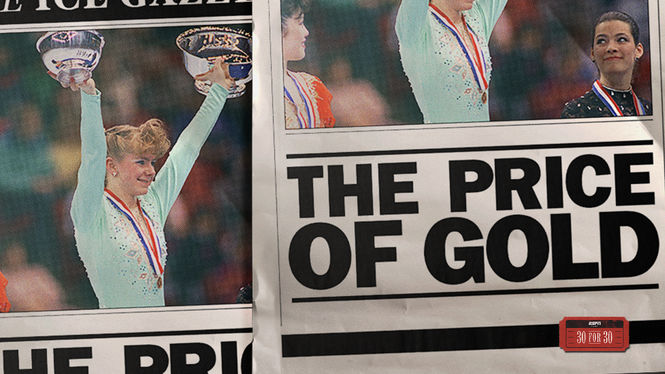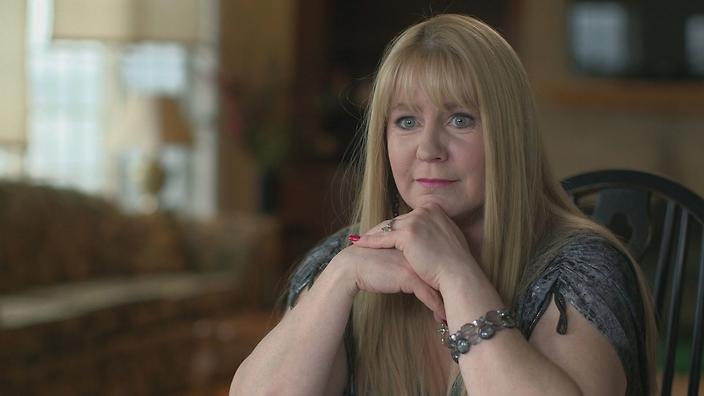By Glenn Dunks

The defining trait of I, Tonya that has separated it from a glut of biopics is that darkly comedic tone achieved significantly through fake direct-to-camera interviews by an assortment of ghoulish villains and anti-heroes. One could argue that with its cast of monstrous characters and flamboyant yet true-to-life costumes and wig-work, the film’s mock documentary device was entirely unnecessary at achieving its desired laughs.
Yet while I saw the value of its method as a sort of short-hand directorial device used to wrangle the story’s many real life contradictions and he-said-she-said-he-said-she-said-he-said narrative, having watched Nanette Burstein’s sublime The Price of Gold, it comes off as actually just lazy...
Burstein was an Oscar nominee in 2000 for another sporting doc, On the Ropes, directed alongside Jane director Brett Morgen, but she is perhaps best known for The Kid Stays in the Picture, another collaboration with Morgen. Made for ESPN’s 30 for 30 series – the very same that gave us the Oscar-winning O.J.: Made in America – its actually quite surprising that the story of Tonya Harding and Nancy Kerrigan that so dominated headlines in 1994 hadn’t been the focus of a documentary before this 2014 release.
Watching Burnstein’s film and I couldn’t help but spot its influence on I, Tonya in quite glaring ways. So much so that I am surprised nobody saw fit to query its status as an original screenplay like they (rightfully) did with Loving last year. Simply claiming the film was adapted from the documentary would have surely snagged them an easy screenplay nomination in the process.
It’s not just that the two films follow the same story. In fact, the two occasionally veer of onto their own tangents – I, Tonya, for instance, focuses much more heavily on the domestic violence angle, whereas The Price of Gold prefers to play up the issue of class (or perceived class considering the Kerrigan family was not as wealthy as most assumed) within the rivalry of Harding and Kerrigan. Likewise, Kerrigan looms larger over the proceedings of the doc than the Margot Robbie starrer and while she herself does not appear, her husband and coach do, while one passage of the doc charts Kerrigan’s rehab efforts in the lead up to the 1994 Winter Olympics.
The doc also offers up a boon of archival footage that was surely a powerful part of I, Tonya’s look. For instance, another documentary filmed by a friend of Harding at age 15 that includes the only recorded video of Harding’s mother, LaVona, in her now famous fur coat and bird on the shoulder is a major highlight. The use of other archival footage including skating competitions, the Olympics, and the abundance of network and cable news outlets who latched onto the story in the post-O.J. void of the 24-hour news cycle allows The Price of Gold to capture the truly crushing, maddening, exhausting atmosphere that I felt Gillespie’s film was sloppy in presenting. This is aided by appearances by the likes of Connie Chung who John Powers who offer light and shadow to the media circus they became a part of – Chung even throwing some delightful shade to the likes of the New York Times in the process.

Whatever my gripes about I, Tonya, however, I continue to give major props to Margot Robbie whose successes in the part are only more impressive after watching the documentary. Tonya’s defiance at her lack of wrongdoing proves to be a powerful cinematic aphrodisiac in both instances. And while I think I, Tonya takes too much of an influence from the documentary’s talking head interludes, it’s easy to see why it would.
Both the doc and the fictional film never seem entirely convinced of Harding’s innocence. Nor should they, really, although Gillespie’s film seems more willing to take her at her word. Nevertheless, her attitude as the hard-done-by girl from the wrong side of the tracks is an uncannily smart one that has remained effective in shifting the narrative in a way that would make Donald Trump and the Republicans proud. It’s perhaps little surprise to learn that Harding herself is a Trump supporter (albeit one without the privilege to vote for him). I liked the way Burstein’s film leaned more heavily into the issue of her guilt or innocence in its closing passages without the irony and that’s ultimately what I think makes The Price of Gold the stronger film and the more worthwhile depiction of Harding, Kerrigan and the entire sordid affair.